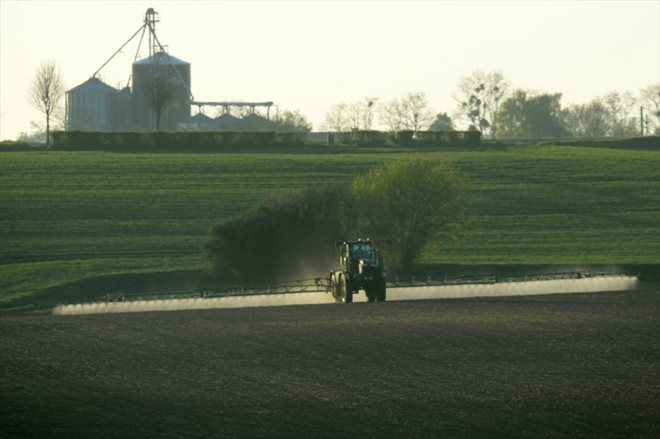With a view to a possible re-authorization of glyphosate on the continent, the European Food Safety Authority (EFSA) will issue a new scientific opinion on Thursday (AFP/Archives/JEAN-FRANCOIS MONIER)
What are the risks of exposure to glyphosate for humans, animals and the environment? In view of a possible re-authorization on the continent, the European Food Safety Authority (EFSA) will issue a new scientific opinion on Thursday on the Bayer herbicide, accused of causing cancer by users in the United States and in Europe. .
The study, eagerly awaited by both farmers and ecologists, is crucial because it must serve as a basis for the European Commission to decide to extend, for five years, the authorization issued on the European market to the most famous weedkiller and which must expire on December 15. A reapproval in which the producers believe, who said they were “quite confident”, according to a representative of Platform glyphosate France (Bayer, Syngenta…) quoted by the specialized media France Agricole.
The International Agency for Research on Cancer (IARC) of the World Health Organization (WHO) in 2015 classified glyphosate as a “probable carcinogen” for humans.
For its part, a group of experts from the National Institute of Health and Medical Research (Inserm) in France concluded in 2021 that “the existence of an increased risk of non-Hodgkin lymphoma with an average presumption of link ” with glyphosate, the active substance of the famous Roundup marketed by Monsanto, acquired by the German Bayer in 2018.
In the United States, lawsuits by people accusing the manufacturer of the absence of warnings on the packaging of Roundup have cost Bayer billions of dollars.
Conversely, the European Chemicals Agency (ECHA) ruled in June last year that the available scientific evidence did not allow classifying glyphosate as a carcinogen.
“ECHA’s Committee for Risk Assessment has formed its independent scientific opinion: the current classification of glyphosate does not change,” ECHA said at the time, the herbicide being classified as being able to cause “damage to the eyes”. and being “toxic to aquatic environments”.
– “Documented” effects –
EFSA was originally due to publish its findings in the second half of 2022, before announcing their postponement due to the “unprecedented” number of comments received. Pending this study, the Commission has extended by one year, until December 15, 2023, the authorization of glyphosate in the EU.
On Wednesday, to mark the occasion, environmental NGOs called on the French government to oppose the renewal of this authorization.
“Our organizations demand that France take a stand against the re-authorization of this substance that is dangerous for health and the environment”, demanded around fifteen NGOs – including Future Generations, Greenpeace, Réseau Action Climat or Les Amis de Earth — in a letter delivered to Prime Minister Elisabeth Borne and other ministries.
“The toxic effects of glyphosate as well as its ubiquitous presence in the environment and living beings are therefore widely documented”, argue the signatories of the letter.
“Yet in mid-June 2021, the four rapporteur Member States in charge of drafting the evaluation file gave a favorable opinion on the re-authorization of glyphosate”, they lament.
Thirty environmental organizations have also collected more than 500,000 signatures in a petition demanding that France opposes “publicly the renewal of the authorization of this toxic pesticide in Europe”.
Emmanuel Macron pledged in 2017 to get out of glyphosate in France “at the latest” in early 2021, before going back on this promise. Agricultural organizations are opposed to this ban, considering that weedkillers remain largely unavoidable, in particular to make room for a new crop without plowing (the practice, a thousand years old, releases carbon and alters soil fertility).
Europe is far from being the only region of the world where the use of glyphosate is debated. Beyond the lawsuits brought by individuals, courts are attacking Bayer: a few weeks ago, the German group agreed to pay around seven million dollars to the State of New York to put an end to lawsuits against Bayer. accusing of misleading consumers, by presenting the herbicide Roundup as a harmless product.
© 2023 AFP
Did you like this article ? Share it with your friends with the buttons below.




